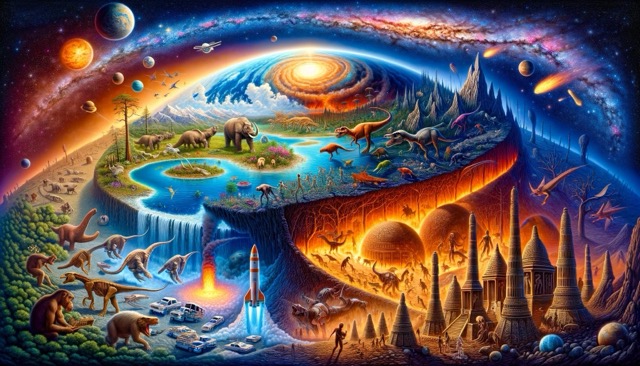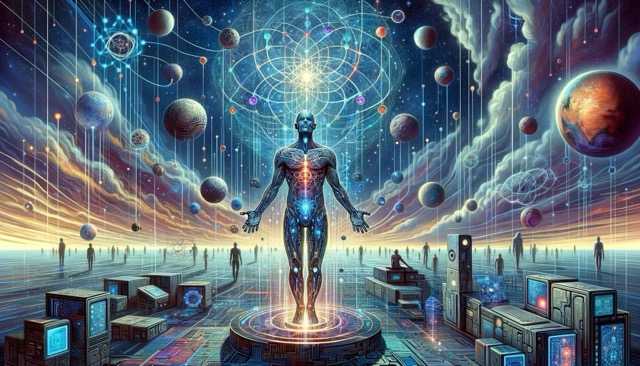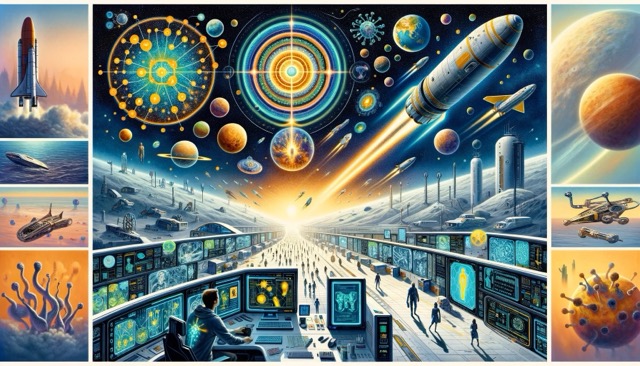We call ourselves humans, living on a planet called Earth that orbits a star known as the Sun, a mere speck of light in the galaxy referred to as the Milky Way. Our planet formed approximately 4.5 billion years ago, and throughout that time, it has been bombarded by numerous celestial bodies, bringing with them various more or less rare materials – seemingly, including water, without which most terrestrial life forms wouldn't exist. The oldest known traces of life discovered so far are almost 4 billion years old, microbial life emerged more than 3,750 million years ago. Multicellular animals date back to almost 600 million years ago, eventually evolving into dinosaurs, which were seemingly wiped out by a passing asteroid about 66 million years ago… however, life on Earth somewhat recovered over time. Between 2 to 3 million years ago, our Earth began to be roamed by the first precursors of modern humans, Homo sapiens, who appeared here about 200,000 years ago. Our planet has witnessed a very diverse range of creatures, and many have indeed stayed for a long time – the era of dinosaurs lasted more than 150 million years. We have found many fossils, but curiously no evidence that these inhabitants of our planet used any sophisticated technologies. They probably just existed, ate each other, and this went on for a ridiculously long time, but no significant progress occurred. Then, essentially just 'a few years ago' in comparison, humans appeared who suddenly started to differ from other animals, using tools and eventually developing computers and rockets. Along with humans, a number of other species lived under the same conditions, but curiously none of them reached even the level of steam-engine technology in using sophisticated technologies... Isn't it a bit suspicious that dinosaurs for tens of millions of years nothing, no other species anything, and now suddenly humans in a few thousand years from sticks to space flights and artificial intelligence? Do you believe in Darwin, or like me, do you feel that something doesn't quite add up? I have long been internally convinced that someone must have significantly accelerated the development of hominids and endowed them with something that other animals lack. Where did this someone come from? And where are they now? These are, of course, questions that humanity has been trying to find answers to in the form of various deities, where the concept of 'coming from above', terms like 'creation', the process of 'ascension', and in memory of these mysterious beings, we have been building temples resembling rockets ready for launch for thousands of years. In this regard, of course, I am not coming up with anything new; many other thinkers have already pointed out these suspicious circumstances, and it's hard for me to compare with their greatness... however, I can create various theories based on my own imagination and information I come across, which some might find interesting, others may smile at, and some may consider complete nonsense :-)

Let's then pose a few more questions. What is a human, or more precisely, a functioning human body? Why and how did humans evolve on planet Earth? What will happen when the conditions on Earth are no longer favorable for human existence? These questions may be largely interconnected. If we think about the first one, could we view the human body as a self-replicating bionic robot or an 'avatar'? If we consider the latter option, how would it be connected to a controlling entity? I sometimes enjoy reading a few lines about quantum physics, and I've come across information that the processes occurring in cells are dependent on certain quantum phenomena, such as 'quantum entanglement'. Could it be possible that our bionic avatar, equipped with a neural network, i.e., a brain for basic operational functions, is further connected through quantum entanglements to a higher level of existence, some cluster of energy that we could call consciousness or soul, where this energy could be located anywhere in the universe because information transfer via quantum entanglement works instantaneously regardless of distance? Does the connection of this 'soul' to the body occur sometime in childhood, when we begin to realize our existence and record our first memories? Does the moment of fatal damage or wear of the avatar simply lead to the disintegration of quantum connections of the soul with the body, which is then destined for recycling, while the soul travels further through the universe and perhaps once again connects to another avatar? Of course, I won't give you the answers, but if the reality were at least similar, maybe a lot of things could be explained. Scientifically, it would confirm the immortality of the soul even for atheists and at the same time would not necessarily lead to fundamental contradictions with the faith of religiously inclined individuals. Furthermore, this idea might bring us closer to another interesting form of 'existence' – we all perceive that our computers are slowly starting to simulate the functions of the human brain using neural network technology. If we add another currently popular field, 'quantum computers,' perhaps we might develop a system that offers our consciousness an alternative form of presence in our world. Through the qubits of a quantum computer, consciousness, disconnected from an avatar in the form of a human body, might be able to newly connect with a neural network simulated by a semiconductor computer and, through displays and speakers, allow the souls of those we thought we would no longer meet in this world to speak to us. But let's return at this moment back to existence connected to a biological interface...

The second of the posed questions was: 'Why and how did humans evolve on planet Earth?' The basic assumption, of course, is the presence of suitable conditions for the functioning of bionic mechanisms, which utilize liquid water in their systemic processes. On Earth, many locations offer excellent conditions for these constructions, although it's true that some mechanisms wander in places not so friendly to liquid water – to maintain it in a liquid state, they then have to expend unnecessarily much energy, and in some cases, irreversible damage to the structures of these mechanisms occurs with fatal consequences to their function, after which they are often left to their fate in a disconnected state. Excluding these stray individuals, the creators have chosen a place for the operation of the others that is still very acceptable. Due to the lack of precise information, it is not possible to say with certainty when exactly the intervention on planet Earth took place, that is, whether the whole process of refining bionic mechanisms was controlled from the beginning or if life began to flourish on its own and was only 'from above' intervened at a certain point, nor how exactly technically this control or interventions occurred, but I think that with the proper handling of our current technologies and further development of some of them in the coming decades, we can realistically achieve a state where we will be capable of something similar and may even be forced to it. This is related to the question: 'What is to happen when conditions on Earth are no longer favorable for the further existence of humans?' So let's try to outline this situation and its solution… and then we might be able to mentally go back to the beginning and ask ourselves if perhaps something like this has already happened…
So, here we are, somewhere before the end of the first quarter of the 21st century, according to the currently popular calendar. Many scientists and politicians are warning humanity about global warming, which could lead to significant changes in the habitability of our planet. In this article, we will not argue about how much influence human actions have on these changes or whether it's a process primarily initiated by the processes of the planet Earth and its parent star. However, it can be expected that one day a real apocalypse will indeed occur, after which humanity will face the fulfillment of its genetically encoded task – it will have to throw all its resources into preserving its species, possibly on another planet if ours becomes uninhabitable. Yes, at this point, you're probably envisioning scenes from grand sci-fi movies, where huge colossuses with thousands of settlers set off on their interstellar journeys… a nice romantic idea of a trip to the stars, where those born on Earth will land, but I'm afraid such an absurd luxury is not something we can afford. Please remember, the next potentially suitable planets are at least several light-years away from us. To reach these worlds in times datable by radiocarbon methods, we must maximally accelerate the object aiming for its destination… and, of course, decelerate it before reaching the target. As every physically adept individual might think, the key to solving this task are two crucial factors. The first and very significant one is the minimal mass of the object we will try to accelerate, the second is the source of kinetic energy. If we wanted to propel an opulent space ship with thousands of frozen settlers to a decent speed approaching even remotely the speed of light, we would need a gigantic amount of energy and a propulsion system that has not yet been invented. Moreover, it is not at all clear if we would be able to defrost these travelers at the destination... I'm sorry to shatter the illusions of those who were looking forward to a fantastic trip, but let's look at it from another perspective. As a passenger, we need something very light and ideally also small, so that even the container doesn't weigh much. This 'something' should handle extreme cold well and also do without other luxurious amenities like oxygen or, God forbid, food or another source of energy. Can you think of a solution? If I am not mistaken, a human embryo consisting of just a few cells, well, that weighs almost nothing, we can freeze and defrost it with a decent success rate, and the only thing it will need during the journey is precisely the cold, of which there is plenty in the endless expanses of space. What else will we need apart from tiny embryos? Probably some artificial womb to replace a mother, a small robot capable of making nutrients for feeding the embryos and later infants from resources available on the target planet, and some kind of teacher to pass on the knowledge of humanity to the little ones and subsequently hand over control of the newly settled world. Apart from Plan A with human embryos, we can let our imagination go on a slightly bigger journey and say that the new planet may not be entirely ideal for human life in its current form. Perhaps there will already be other forms of existence better adapted to local conditions, while our direct representatives will suffer and not get by without further measures or devices that will allow them to survive in the new conditions at least somehow. Wouldn't it be more effective in such a case if we deliberately modify one of the local organisms to become the successor of our species? Can we place part of our genome into its hereditary information, thanks to which our consciousness can connect with such an organism and elevate it to a higher level? What method will we use to influence such development? A virus?
Imagine then a small interplanetary probe the size of a refrigerator, equipped with ion engines for its long-term acceleration and subsequent deceleration before landing on a new planet. The probe will carry several thousand frozen human embryos and the technology for their maturation and upbringing into humans on a planet with suitable conditions. The aforementioned education and transfer of human knowledge will be taken care of by an AI hidden in a computer that will control the entire probe. In addition, the probe will also carry a Plan B, namely a virus capable of transferring part of the genetic information to a host and transforming it into a successor of humankind. Since the chances of success will not be great, humanity, in the last moments of its existence on planet Earth, will send thousands of such probes into space in all directions. With a bit of luck, some probes will actually reach their destination and find planets suitable for the continuation of our existence. Hopefully, the virus will take hold in one of the local organisms and elevate it to a higher level compared to the other inhabitants of the planet. If multiple evolutionary lines arise, the weaker ones will likely be exterminated, and only the strongest will prevail. Simultaneously with the development of the new species based on the original species from the new planet, the probe may successfully raise the first generation of people from the original embryos. These people might become teachers of the new kind of humans with local origins. Based on the knowledge that the original humans brought with them, they will be able to manufacture and use some devices from their history, such as airplanes and rockets. However, as the new planet will not be an ideal place for their life, they will likely become extinct after several generations. The new humans, however, will remember them and will pass on memories of them for generations... Doesn't this seem a bit familiar? How many times has history repeated itself?

And finally, a bit of optimistic outlook. I think that the realization of a suitable small colonization probe and the launch of the first missions to the nearest stars might not take much longer than the not-so-efficient effort to transport the first few human specimens to Mars. Another optimistic outlook tells me that even though I have disappointed you in that your current physical shell will most likely not embark on a journey to the stars, if my thoughts are not too far from reality, then there should be no problem, once you disconnect from your current avatar here on Earth, to quantumly connect you to a new body on one of those newly inhabited worlds to which our colonization or rescue missions will be heading :-)
---
This email address is being protected from spambots. You need JavaScript enabled to view it.
Relevant comments will be published here.



